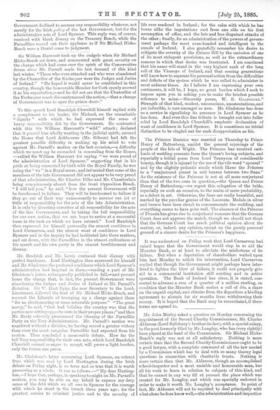To this speech Lord Randolph Churchill himself replied with a
compliment to his leader, Sir Michael, on the remarkable " dignity " with which he had expressed the sense of heavy responsibility felt by the Government. He contrasted with this Sir William Harcourt's "wild" attack; declared that it proved him wholly wanting in the judicial spirit; assured the House that Lord Ashbourne (Mr. Gibson) had felt the greatest possible difficulty in making up his mind to vote against Mr. Parnell's motion on the last occasion,—a difficulty which we must say he succeeded in concealing from the House, —rallied Sir William Harcourt for saying "we were proud of the administration of Lord Spencer," suggesting that in his pride at being connected by birth with the Royal Family, he was using the " we" in a Royal sense; and intimated that some of the members of the late Government did not appear to be very proud of that administration, Sir Charles Dllke and Mr. Chamberlain being conspicuously absent from the front Opposition Bench. "I will tell you," he said, "how the present Government will be foredoomed to failure. They will be foredoomed to failure if they go out of their way unnecessarily to assume one jot or tittle of responsibility for the acts of the late Administration. It is only by divesting ourselves of all responsibility for the acts of the late Government, and by taking the full responsibility for our own action, that we can hope to arrive at a successful issue in the task on which we have entered." Lord Randolph then expressed for himself personally the utmost confidence in Lord Carnarvon, and the utmost want of confidence in Lord Spencer and in the inquiry he had instituted into these matters, and sat down, with the Parnellites in the utmost enthusiasm at his speech and his own party in the utmost bewilderment and dismay.


































 Previous page
Previous page